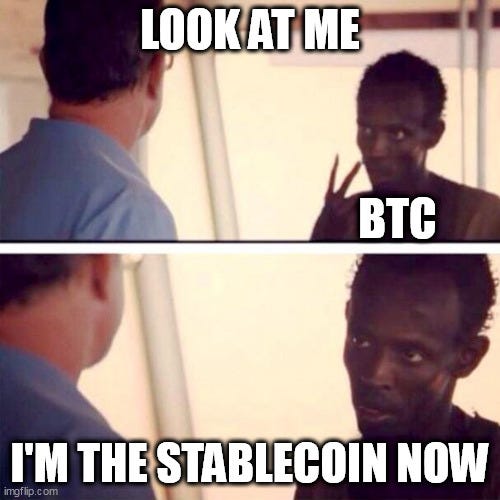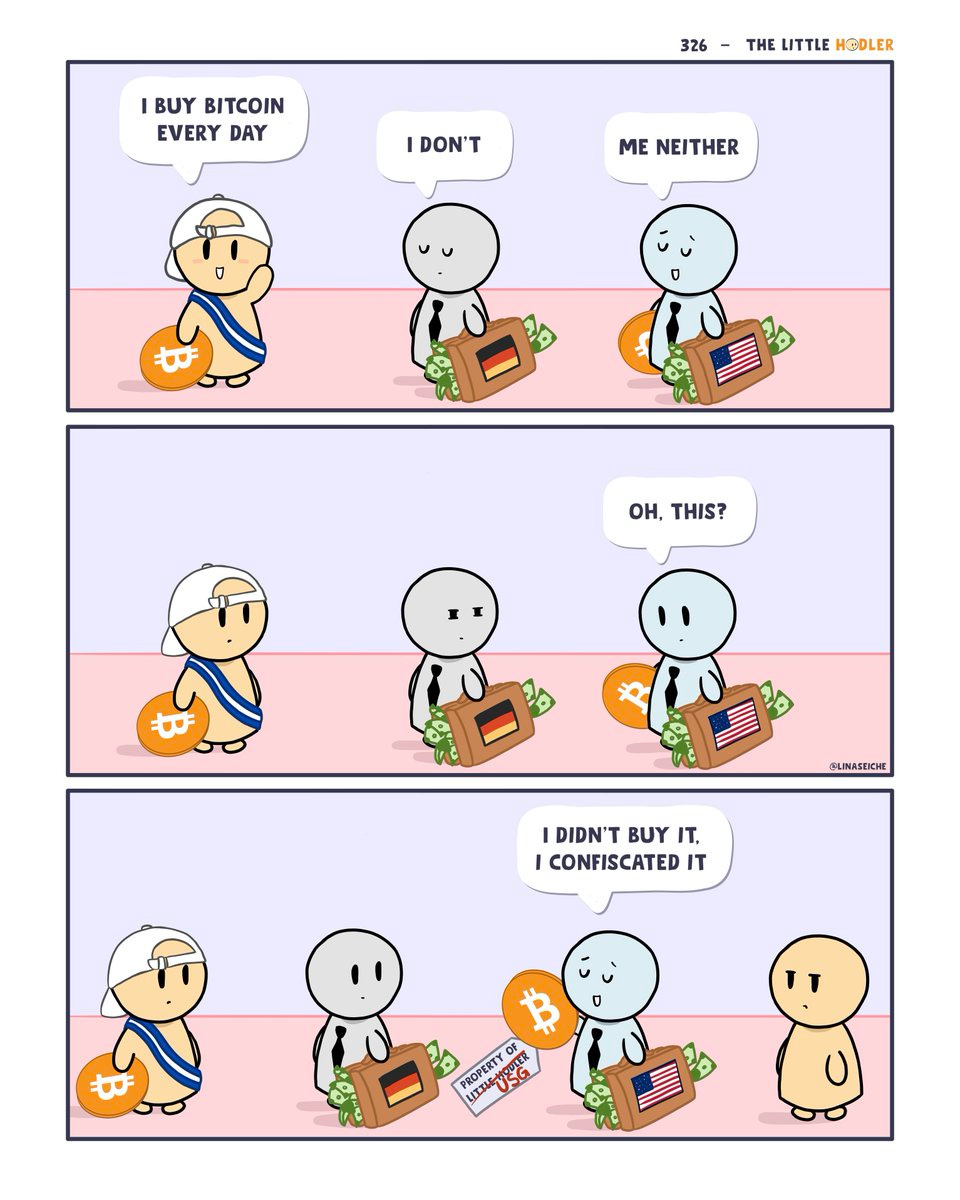Bitcoin Tech Talk #462
Interesting Stuff
Lost Nuclear Knowledge - This is a pretty long read about nuclear power and specifically, about the lost US capacity for enriching uranium. If you’re not familiar, nuclear power plants require uranium that’s some significant percentage a uranium isotope. Indeed, this is also required for nuclear weapons, though the percentage is way higher (90% vs 20%). It’s also nominally the reason for Israel’s strike against Iran. But then to find out that the US hasn’t been able to enrich uranium since 2013 is a bit of a shock. As the article notes, enriched uranium is the one thing the US has been buying from Russia despite all the sanctions from the war in Ukraine. This is how civilization breaks down, in lost knowledge and capacity leading to reduced capabilities.
The Wrong Road for AI - LLMs have trillions of investment at this point and with the release of ChatGPT5, expectations are higher than ever, many people thinking that it will result in some sort of AGI. Yet as this article shows, LLMs cannot lead to AGI and that most engineers that actually make these systems already know this. What keeps the hype alive is all the money and bureaucracy that’s built up around it, which is not uncommon in a fiat system. What’s amazing isn’t that this process has happened, but that it’s happened so quickly. Time will tell whether the point of diminishing returns has been reached or not, but as the article argues, there’s almost certainly a significant amount of malinvestment in the space already.
Open Banking - This is another really informative post on the current banking system and the current kerfuffle over API access to banking infrastructure called Open Banking. The main financial incentive here is that ACH is orders of magnitude cheaper than credit or debit cards (2/100ths of a cent per transaction!) which is why you can Venmo or CashApp your friends for free but using your credit card costs 2%. The banks want to charge for Open Banking as it’s eating into their credit and debit card profits while all the businesses built on this API access don’t think it’s fair, especially since Open Banking has been used from 2009 or so. If this sounds familiar, it should. We’re likely to face the same sort of cartel behavior in Bitcoin with miners about lightning providers.
Profiles of Rent-Seekers - The article is nominally about how little most people work and the various explanations for why they’re allowed to get away with it. The possible explanations range from the oblivious 1000x employee to some sort of wealth distribution scheme implicitly for elitist beliefs, but the main one isn’t really explored much, which is that the availability of debt and regulations that prevent competition allows these firms to stay inefficient and over-hire. As one very cynical X post said recently, corporation jobs are a combination of adult daycare and UBI.
Misdiagnosing Boredom - Sometimes the history of a word and its various connotations that it’s gone through gives insight into the current cultural situation. The word boredom has a long history and the article looks at it as a way to diagnose our current societal complaint of being bored all the time. As the article shows, boredom used to signal a sort of refined upper class-ness. It’s now a feature of anhedonia, or the inability to really feel excited about much because of over-stimulation. In other words, the problem with boredom isn’t out there (as in not enough things excite us) but inside where we’ve been conditioned by the hedonic treadmill. If anything we need more time being bored than less.
What I'm up to
Young America’s Foundation Road to Freedom - I will be speaking at this conference in Raston, VA (alongside Yeonmi Park and EJ Antoni) to a bunch of college students October 3-4. I’ll speak about the trucker protests as a launching point for embracing non-governmental, politically neutral money.
Lugano Plan B Forum - A few weeks later October 24-25, I will be in Lugano for the Plan B Forum. It looks like I may be doing a debate and running a workshop for my open source project, the family Bitcoin banking app.
Nostr Note of the Week
What I’m Promoting
Bitcoin
Proto - This is, without a doubt, one of the biggest announcements in the mining space in years. Block, Jack Dorsey’s company, has been working on creating an open source miner for the past few years and their market research shows. The big game changer is modular components, or hashing boards that can be hot-swapped in and out while the rest of the machine keeps mining. As miners know, the loss from defective miners is significant as is the build out of data centers to accommodate specific machine form factors. I have no doubt that these machines or something very similar will be the vast majority of mining in data centers in the next decade or two.
Ark Trustless Lottery - Trustless lotteries have been something that a lot of people have tried implementing on Bitcoin, but has always been limited by Script’s lack of expressiveness. This post shows how you can make a trustless lottery with linearly scaling signatures required to make a trustless lottery where each participant provides randomness. What’s more, the design eliminates the collateral requirements because it uses the VTXO transfer mechanism. The implications go beyond lotteries as the same techniques can be used for multi-party computing and even zero-knowledge protocols.
broadnym - This is a project to make transaction broadcasting more anonymous by using the Nym Mixnet. Usually, transactions that want some broadcast privacy do so through TOR, but if you believe it to not be secure enough, this is another option. I like the idea of getting off of the Bitcoin network to broadcast, as doing that requires more work for the would-be attacker as in submarine swaps. If Nym Mixnet proves robust, this sort of project may become useful for all sorts of other Bitcoin and Nostr contexts.
Lightning
SugarDaddy - This is a fun little hackathon project where you can upload a receipt of something and have someone on the web pay for it. It’s not unlike the phenomenon of early Nostr where people would post random Lightning invoices which would get paid, except here, the receipt is in fiat and the lightning invoice for the equivalent amount calculated. The joke here being that this is exactly the sort of thing that would appeal to sugar daddy/baby dynamics.
Lightning as L2 Connective Tissue - The article makes the very compelling case that almost all the L2s coming to Bitcoin are using Lightning to bootstrap their networks. You can convert eCash to Lightning by paying an invoice. You can use Lightning invoices on Ark as well. The trend has been going on for some time, and I suspect any L2 that doesn’t support Lightning is at a huge disadvantage going forward.
Securebit Chat - This is an interesting new project for secure messaging that doesn’t rely on centralized servers the way Signal, WhatsApp and other messaging platforms do. What’s more, this chat app also integrates Lightning, so you can securely transfer payments and have stuff like pay-per-session chats and so on. I can imagine something like this becoming very useful for whistleblowers in particular, as the economic incentives can be better utilized for exposing corruption.
Economics, Engineering, Etc.
Stablecoin Thesis - Allen Farrington writes this clear-headed explanation of what makes stablecoins useful but also why it will eventually be subsumed by eCash or a similar technology. As he notes, the reason why stablecoins, really, Tether, has succeeded is because it’s miles better than the fiat alternative. That is, despite the cumbersomeness of different blockchains, the payment settlement is still cheaper than the traditional methods and the users can get closer to the base money, whether by converting from their local fiat currency to dollars, or by having essentially a fully reserved account instead of a fractionally reserved one. I came away thinking that stablecoin demand is really more of a threat to the current banking system than Bitcoin.
Treasury Company Agreements - BitMex blog reads the treasury company agreements, specifically the altcoin treasury companies. The main discovery is that each treasury company has an investor of some kind that’s not the treasury company investor that gets preferential treatment, like getting options to buy a bigger stake if certain thresholds are met and being paid even if the price of the treasury company stock languishes. As the blog post states, Bitcoin treasury companies have a clear strategy based on mNAV where the retail investor wins big if the mNAV continues to be large, but doesn’t lose too much if the mNAV dips below 1. By contrast, altcoin treasury companies have this only for the preferred investor and not retail.
Qubic Reorgs Monero - One group of altcoiners from Qubic attacked Monero in a selfish-mining style 51% attack and managed to reorg a bunch of blocks, orphaning 60 blocks over a 24-hour period, ostensibly to make more coins re-orging than honest mining. The link goes to a delvingbitcoin post which analyzes the economic incentives and shows that any proof-of-work algorithm that’s ASIC-resistant is bound to be vulnerable in the same way. I suspect that the truth is even stronger, in that any proof-of-work that’s not the top dog can be attacked in a similar way.
Quick Hits
5 Years - Crazy to think that Strategy has now been stacking BTC for 5 years
Google Non-Custodial Wallet Snafu - Apparently, they announced that non-custodial Bitcoin wallets were banned on the Play store and then clarified that they weren’t.
Bo Hines Out - The Trump administration’s “crypto” advisor has been relieved of his role.
Bessent on Bitcoin - He first made news by saying that the government would just keep the seized Bitcoin, but then later in the week made this X post saying how they’re looking at budget-neutral ways to acquire Bitcoin.
Mining Profitability - An honest assessment from a miner about what makes and breaks mining companies.
Fiat delenda est.







